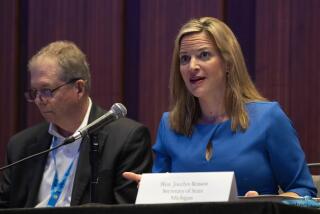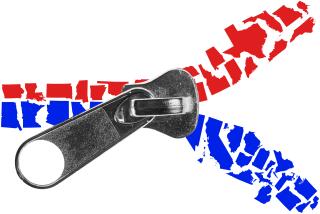Governors Facing Dispute Over Energy
- Share via
INDIANAPOLIS — Thursday’s blackout came too late to make the formal agenda of the nation’s governors meeting that kicked off Saturday, but updating the nation’s power system is a hot topic among state leaders with competing interests.
The dispute became clear at what was supposed to be a feel-good press conference to kick off the National Governors Assn.’s summer meeting.
Idaho Gov. Dirk Kemp- thorne, the Republican vice chairman of the group, said the nation’s outdated power grid threatens to affect every state and that governors would work on a solution.
But the group’s Democratic chairman, Gov. Paul Patton of Kentucky, said it will be difficult for governors to reach a consensus. Patton said energy in his coal-rich state is cheap and reliable and he would oppose a plan that would require Kentucky taxpayers to share the cost of solving electricity problems in other states.
“We want the people who benefit from that electricity to pay for it,” he said. “There is a real danger of a stalemate.”
The debate is not partisan, but regional. The Midwest and Northeast have more urgent upgrade needs, while the South enjoys cheaper electricity than other parts of the country.
Patton said no governors had canceled plans to attend the meeting because of the blackout. The governors of Connecticut, Pennsylvania, New York and Ohio had already decided against attending before the blackout.
Michigan Gov. Jennifer Granholm, a Democrat, decided to come after electricity was restored in her state. She wanted to talk with other governors about what can be done, said her spokeswoman, Genna Gent.
“There’s nothing to suggest the same kind of thing can’t happen in other states,” Gent said. “If they don’t know why it happened yet, you can’t say it wouldn’t happen elsewhere.”
Democratic Gov. James E. McGreevey of New Jersey said the federal government must develop smart technology to make sure such a widespread blackout is not repeated.
Iowa Gov. Tom Vilsack, a Democrat, said governors who attended a closed-door lunch Saturday agreed that they do not want the federal government to take over the power system. All states still want to be able to determine the location of power stations and transmission lines and make other local energy decisions, he said.
Agreeing on who should pay to update the nation’s system may not be simple, he said.
“I think the cost has to be shared,” he said. “That’s a Midwestern value.”
States already are grappling with deficits, and some governors are not eager to add the cost of fixing the energy problem.
More to Read
Sign up for Essential California
The most important California stories and recommendations in your inbox every morning.
You may occasionally receive promotional content from the Los Angeles Times.













